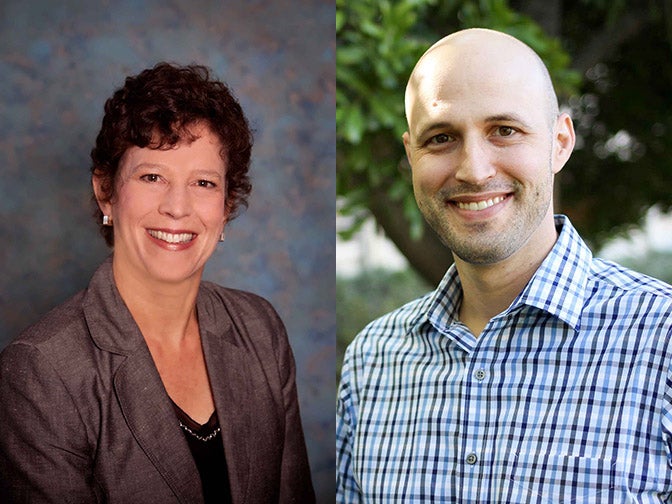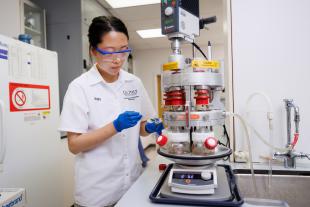Professors Partner with Artificial Intelligence Pioneer to Publish Innovative Research

Two Cal Poly professors and Unanimous AI on Wednesday will present a new study showing that business teams, when connected by AI algorithms and operating as an internet-linked “swarm,” functioned with significantly higher social intelligence than individuals working alone.
Entrepreneurship Professor Lynn Metcalf and communication studies Professor David Askay spent the summer on the cutting edge of artificial intelligence technology. In collaboration with AI pioneer Unanimous AI, a Silicon Valley-based technology firm that amplifies the intelligence of groups through special AI algorithms, they recently published research examining the effectiveness of business teams functioning as a “hive mind.”
This innovative Swarm AI technology allowed teams, connected over the internet, to combine their individual insights in real-time to accomplish tasks and make decisions.
The presentation at the first Institute of Electrical and Electronics Engineers International Conference on Artificial Intelligence for Industries held in Laguna Hills, Calif., will showcase their study, which asked 60 small teams to take a standard social intelligence test known as “Reading the Mind in the Eyes” (RME). Prior studies have proved the RME test as a strong predictor of team effectiveness and overall collective intelligence. As individuals, participants averaged 68 percent accuracy on the test, but, when working together as an AI-powered “hive mind,” the teams averaged 85 percent accuracy — a significant improvement.
“This is an exciting result,” Metcalf said. “It suggests that business teams can be significantly more effective at making group decisions if they work together, connected by Swarm AI algorithms.”
Swarm AI technology connects distributed human teams into real-time intelligent systems modeled after swarms in nature, emulating the way birds flock, fish school and bees swarm to amplify their collective intelligence. It builds a real-time “hive mind” over a communication network, moderated by AI algorithms, to combine the group’s knowledge, wisdom, insights and intuition into an optimized output.
“When it comes to decision-making technologies, most uses of AI are aimed at replacing people with algorithms,” said Askay. “What is most exciting about this study is that we’re not replacing people — we’re keeping them in the loop, using AI to optimize their knowledge, wisdom and collective intelligence in real-time.”
Metcalf, Askay and the team see many potential applications of Swarm AI technology among business teams, from making optimized decisions to more accurately forecasting how consumers will react to marketing messaging, product features, or sales tactics. Cal Poly and Unanimous AI are currently continuing research that further explores Swarm AI’s potential benefits.
Unanimous AI founder Louis Rosenberg, a former faculty member in Cal Poly’s College of Engineering, is excited by Swarm AI’s potential as a business tool. “We’ve seen Swarm AI technology be extremely effective at amplifying the intelligence of large groups,” he said. “But this study is the first to explore the use among small teams. The results were stronger than we expected, opening many new business applications.”
Metcalf has a broad spectrum of research expertise — including qualitative research methods, package design for marketability, innovation and entrepreneurship, and international business negotiation — but she’s found this venture into AI particularly exciting.
“Swarm AI technology has can absolutely change the way we utilize and think about teams, specifically in the business world,” she said. “This research is just the beginning.”




